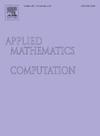Supervised cooperation on interdependent public goods games
IF 3.5
2区 数学
Q1 MATHEMATICS, APPLIED
引用次数: 0
Abstract
It is a challenging task to reach global cooperation among self-interested agents, which often requires sophisticated design or usage of incentives. For example, we may apply supervisors or referees who are able to detect and punish selfishness. As a response, defectors may offer bribes for corrupt referees to remain hidden, hence generating a new conflict among supervisors. By using the interdependent network approach, we model the key element of the coevolution between strategy and judgment. In a game layer, agents play public goods game by using one of the two major strategies of a social dilemma. In a monitoring layer, supervisors follow the strategy change and may alter the income of competitors. Fair referees punish defectors while corrupt referees remain silent for a bribe. Importantly, there is a learning process not only among players but also among referees. Our results suggest that large fines and bribes boost the emergence of cooperation by significantly reducing the phase transition threshold between the pure defection state and the mixed solution where competing strategies coexist. Interestingly, the presence of bribes could be as harmful for defectors as the usage of harsh fines. The explanation of this system behavior is based on a strong correlation between cooperators and fair referees, which is cemented via overlapping clusters in both layers.
相互依存的公共产品博弈的监督合作
实现自利主体之间的全球合作是一项具有挑战性的任务,这通常需要复杂的激励设计或使用。例如,我们可以聘请能够发现和惩罚自私的主管或裁判。作为回应,叛逃者可能会向腐败裁判行贿,以使其保持隐匿,从而在监管者之间产生新的冲突。通过使用相互依赖的网络方法,我们对战略和判断之间共同进化的关键要素进行了建模。在博弈层中,代理人通过使用社会困境的两种主要策略中的一种来进行公共物品博弈。在监控层,管理者跟踪战略变化,可能会改变竞争对手的收入。公正的裁判惩罚叛逃者,而腐败的裁判则对贿赂保持沉默。重要的是,不仅球员之间,裁判之间也有一个学习的过程。我们的研究结果表明,大额罚款和贿赂通过显著降低纯背叛状态和竞争策略共存的混合解决方案之间的相变阈值来促进合作的出现。有趣的是,对脱北者来说,贿赂的存在可能和使用严厉的罚款一样有害。这种系统行为的解释是基于合作者和公平裁判之间的强相关性,这种相关性通过两层的重叠集群得到巩固。
本文章由计算机程序翻译,如有差异,请以英文原文为准。
求助全文
约1分钟内获得全文
求助全文
来源期刊
CiteScore
7.90
自引率
10.00%
发文量
755
审稿时长
36 days
期刊介绍:
Applied Mathematics and Computation addresses work at the interface between applied mathematics, numerical computation, and applications of systems – oriented ideas to the physical, biological, social, and behavioral sciences, and emphasizes papers of a computational nature focusing on new algorithms, their analysis and numerical results.
In addition to presenting research papers, Applied Mathematics and Computation publishes review articles and single–topics issues.

 求助内容:
求助内容: 应助结果提醒方式:
应助结果提醒方式:


